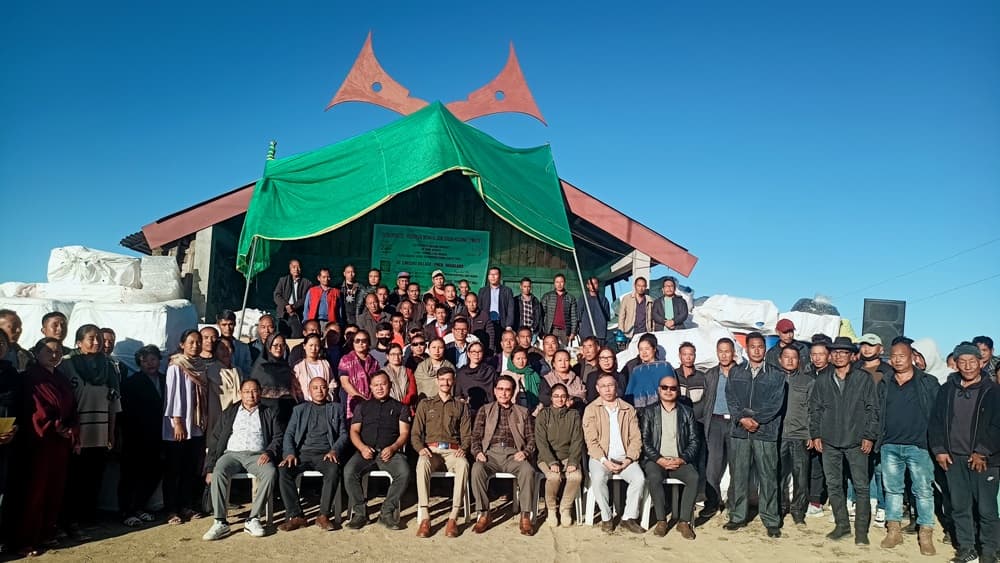MONDAY, NOVEMBER 17, 2025
- Home
- Rural economy key to Nagaland’s future, says KG Kenye
Rural economy key to Nagaland’s future, says KG Kenye
KG Kenye says Nagaland’s future depends on strengthening the rural economy while launching the Pradhan Mantri Vandhan Yojana and VDVK cluster support programme in Chizami village.
Share

CHIZAMI — Minister for Power and Parliamentary Affairs KG Kenye on Monday said that economic discussions in Nagaland have long been overshadowed by politics, cautioning that without a strong economy, “the people will become beggars.”
He was speaking at the launch of Pradhan Mantri Vandhan Yojana (PMVDY) and distribution of tools and equipment for Kezuwe, Letshe, Kepolu and Khomi Vandhan Vikas Kendra (VDVK) clusters at Chizami village in Phek district.
The initiative was sponsored by TRIFED, Union Ministry of Tribal Affairs, and organised by Nagaland Beekeeping and Honey Mission (NBHM).
Kenye reminded the gathering that self-sufficiency was a value upheld by Naga forefathers, unlike the growing dependence seen today.
Highlighting Nagaland’s natural wealth, he reminded that the state is among the world’s five major biodiversity hotspots and is endowed with resources many others do not possess.
He urged citizens to make better use of these natural gifts, saying Nagas must learn to supply what others cannot produce while importing only what is necessary.
Also read: Nagaland joins UN’s global ‘Making Cities Resilient 2030’ initiative
Hard work, he added, remains central. “To be a good society, we must revive the work ethics of our forefathers,” he said.
Kenye also highlighted honey as one of Nagaland’s most naturally superior products, sourced from rich rainforest ecosystems, and called on people to recognise this “gold mine” and tap its market potential.

He acknowledged the Neiphiu Rio-led government for policies aimed at grassroots empowerment and sustainable development.
The minister also commented on the trend of being “stage-centric,” with endless programmes, training sessions and resource-person meetings held indoors. He urged people to step out of conference rooms and return to the fields.
With fertile land and abundant resources, he said that Nagaland must avoid blindly copying other societies and instead focus on producing and exporting its own unique goods.
Also read: Sitharaman highlights development push for Kiphire, inaugurates ITI and attends credit outreach
He underscored a labour-intensive approach over machine-heavy methods.
Kenye further encouraged the continued use of organic practices in fruits, vegetables, handicrafts and handlooms.
With proper organisation, modern tools and streamlined processes from production to packaging and export, Nagaland’s honey and other products could significantly strengthen the rural economy, he said.
“The backbone of our society is the rural economy,” he asserted, adding that without strengthening it, “all these hi-fi ideas will not sustain us.”
Read more: Mountains to Mangroves: Nagaland’s REDD+ pilot takes root
He also urged local entrepreneurs to seize the opportunities provided through the initiative, stating that their efforts could meaningfully contribute to the state’s economic future.
Meanwhile, Dr. Pritpal Kaur, Superintendent of Police (SP) Phek, said that farmers are the backbone of society, as agriculture remains the mainstay.
She called on farmers to take pride in their work, stressed the need for proper branding of products, and urged teamwork. She exhorted the beneficiaries to be hardworking and sustain the project.
Khuvoyi Vese, Deputy Team Leader of NBHM, said that the PMVDY is designed to economically empower tribal people through VDVKs by making judicious use of forest products—collecting, processing, and adding value to prevent wastage and promote entrepreneurship.
He shared that each Vandhan cluster comprises 300 beneficiaries, and through the initiative, 1,200 people from Chizami, Mesulumi and Khomi have benefited.
He added that training and guidance would be provided and called for sincerity and concerted efforts to sustain the initiative.

